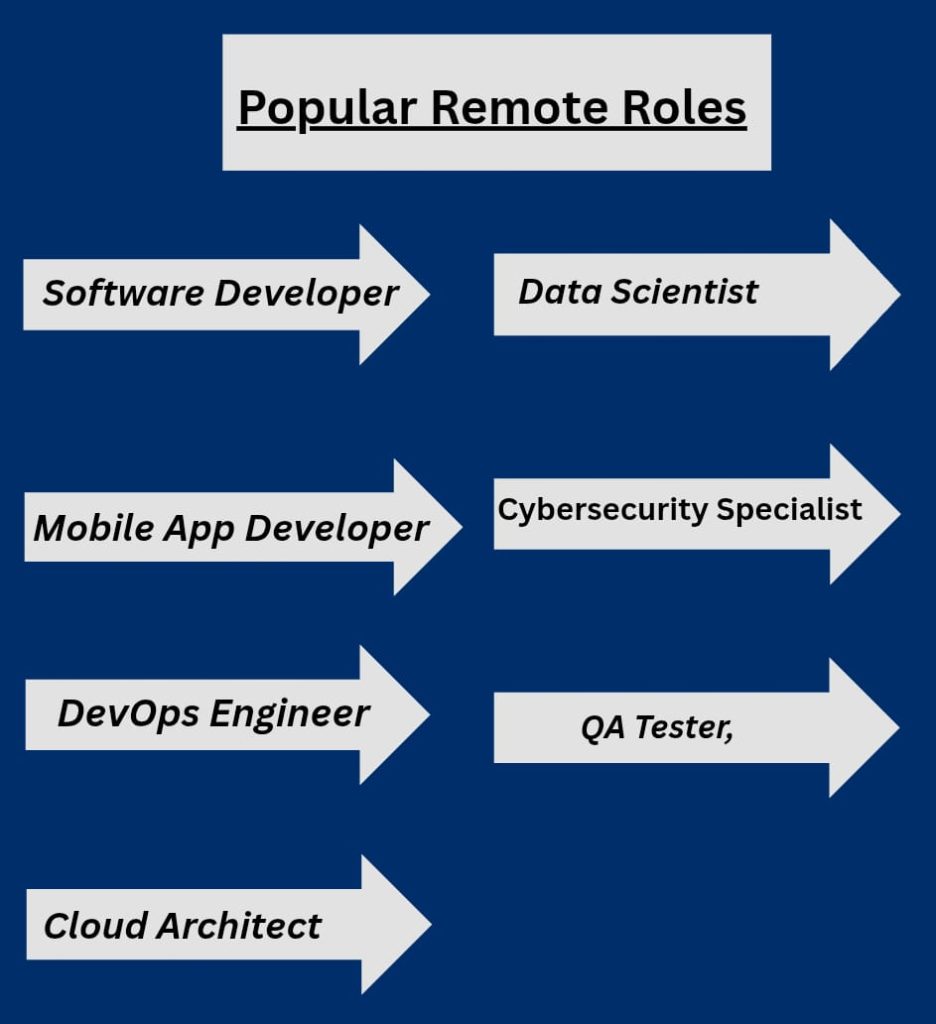Introduction
In today’s digital era, software development is one of those fields that is growing rapidly. The remote work trend is becoming popular in the IT sector because tasks like problem-solving, coding, and designing can be done without physical presence in the office.
Now, remote IT jobs are not only a work option but a career lifestyle. Companies are hiring talented developers, data scientists, and cybersecurity experts for their projects globally. By this, professionals are getting flexibility, better work-life balance, and international opportunities.
In this article, we will see which remote roles are most in demand in the IT and software development field, what the necessary skills are, and how you can grow your career through a remote IT job.
Read the summary of this article here.
What is a Remote Job?
Remote jobs are basically those jobs in which you don’t have to go to the office daily. You can work from home or anywhere where the internet is available. In remote jobs, employees and employers connect using online tools such as Zoom Meetings, Slack Chat, Google Meet, Email, or Project Management Apps. It makes the flow of work smooth without physically being present in the office.
Remote jobs offer flexible options in which you can work according to your convenience. These jobs are very popular in today’s digital era because they save time, remove the problem of commuting, and make it easier to achieve a work-life balance.
Remote jobs are becoming popular every day because they create a win-win situation for both employees and the company. Remote jobs provide flexibility to employees, as they can work from anywhere, according to their convenience, they save on the cost of travel and commute, and can spend more time with their family. Also, it is beneficial for companies as well because companies do not have to spend money on office space, electricity, and infrastructure. Besides, these companies also get the chance to hire global talent without geographical boundaries.
After COVID-19, people have gained experience from work-from-home and they realized that working from home does not reduce productivity instantly; sometimes the productivity of employees doubles. That’s why remote jobs are not only a trend, but it is a long-term career option.
Popular Remote Roles in IT & Software Development

1. Software Developer / Engineer (Frontend, Backend, Full Stack)
Responsibilities:
Software developers design, develop, and maintain applications and systems.
Frontend Developers:
Front and developers create the user facing side of the website and apps which are shown to users.
Backend Developers:
Handles server, APIs, and databases so that the app can run smoothly.
Full Stack Developers:
Full-stack developers work in both areas and provide end-to-end solutions.
Skills/Tools:
JavaScript, React, Angular, Vue (frontend) | Python, Java, Node.js, Ruby, SQL (backend).
Why Remote-Friendly?
Code can be written anywhere you just need a laptop and the internet. The whole team can work globally with the help of collaboration tools like GitHub and GitLab.
2. Mobile App Developer in IT and Software Development
Responsibilities:
Mobile app developers create mobile applications for businesses that can run smoothly on iOS and Android.
IOS Developers:
They create iPhone and iPad apps using Swift or Objective-C.
Android Developers :
:Android developers create apps for the Android OS using Java and Kotlin.
Cross-Platform Developers:
These developers create apps for both platforms with a single code using Flutter, react native, or Xamarin.
Skills/Tools:
Swift, Kotlin, Java, React Native, Flutter, Firebase.
Why Remote-Friendly?
ID and device simulators are needed for app development. The team can design and code remotely without a physical office setup.
3. DevOps Engineer in IT and Software Development
Responsibilities:
A DevOps engineer creates a smooth process between development and IT operations.
- Implement CI/CD pipelines.
- Automate software deployment.
- Monitor Servers and reducing downtime.
Skills/Tools:
Docker, Kubernetes, Jenkins, GitLab CI, Terraform, Ansible.
Why Remote-Friendly?
Servers and deployments are managed remotely. DevOps engineers can work from anywhere with the help of cloud infrastructure.
4. Cloud Architect / Cloud Engineer
Responsibilities:
Cloud engineers create secure and scalable cloud solutions for companies.
- Data migration to cloud.
- Designing security and backup solutions.
- Doing scalable storage and networking setup.
Skills/Tools:
AWS, Microsoft Azure, Google Cloud, Docker, Kubernetes.
Why Remote-Friendly?
It can be easily handled with remote work because the work of the cloud happens on online servers and platforms.
5. Data Scientist / Data Analyst
Responsibilities:
A data analyst cleans data and creates dashboards and reports, which help in business decision-making.
Data Scientist:
Data scientists create predictive models and AI/ML algorithms so that companies can understand the market trends and customers.
Skills/Tools:
Python, R, SQL, Tableau, Power BI, TensorFlow, Pandas, Excel.
Why Remote-Friendly?
Analysis can be done remotely because data online is available and only tools and cloud resources are important for processing.
6. Cybersecurity Specialist in IT and Software Development
Responsibilities:
The responsibilities of a cybersecurity specialist are protecting the data and systems of organizations from hacking, phishing, and malware.
- Security audits and penetration testing.
- Threat monitoring and incident response.
- Encryption and firewall management.
Skills/Tools:
Wireshark, Splunk, Metasploit, Nessus, Security+ certification.
Why Remote-Friendly?
Threat detection and monitoring tools operate online. Security patches and protocols can be implemented remotely.
7. QA Tester / Automation Engineer
Responsibilities:
QA Testers:
Test software for bugs and usability.
Automation Engineers:
Make an automated script that runs repeated test cases so that the product can be ready for market.
Skills/Tools:
Selenium, Appium, JUnit, Postman, TestRail.
Why Remote-Friendly?
Software and devices are only important for testing. Automated testing also works easily on remote servers.
Why IT & Software Development Fits Remote Work?
Nature of work (digital-first, tool-driven).
The work in IT and Software Development is completely digital — coding, designing, testing, and deployment are all managed through online tools and platforms. This means you don’t need a physical office; with just a laptop and internet connection, you can work from anywhere. Tools like GitHub, Jira, and Slack make this process even smoother.
Flexibility and global collaboration.
Remote IT jobs give professionals flexibility to manage their own time and schedule. If you’re working for an international company, you also get the chance to collaborate with people from different countries. This global exposure helps you grow your skills faster, as you learn new perspectives and approaches by working with diverse teams.
Cost-saving for companies and access to global talent for employees.
Remote work is profitable for companies too, because they don’t have to spend on office rent, utilities, or physical infrastructure. For employees, it’s a win-win situation, since they don’t need to relocate and can still work on global projects. This means you could be sitting in a small town and still work on Silicon Valley-level projects.
Skills in Demand for Remote IT and Software Development Jobs
Programming languages (Python, JavaScript, Java, etc.).
Mastery in one or two programming languages is important. If you use Java, Python, C++, or JavaScript, then keep a strong hold on their syntax, libraries, and common functions. Interviewer, see if you used your preferred language efficiently. For example, Python is best for quick problem solving, and Java and C++ are best for performance.
Cloud platforms (AWS, Azure, GCP).
Nowadays every company is using cloud services. Learning basic concepts of AWS, Azure, and GCP, like storage, compute, deployment, and security, is helpful. It is in high demand, especially for DevOps backend and full-stack roles.
If you want help in understanding it more, the Best Job Tool platform is perfect. It shows trending technical skills and industry requirements.
Version control (Git, GitHub, GitLab).
Version control is a must-have skill for team collaboration.
Git: Used to track and manage code.
GitHub / GitLab: Allow remote teams across the globe to work together on a single project.
This skill is the backbone of remote work, because without it, handling code conflicts and errors becomes very difficult.
Remote collaboration tools (Slack, Trello, Zoom).
In remote jobs, the biggest challenge is communication and tools to help solve problems.
Slack: team chat and quick communication.
Trello: help in project management and task tracking.
Zoom/ Google Meet: for video calls and team meetings.
Use these tools effectively because it is very important for productivity and a smooth workflow.
Cybersecurity awareness for IT and Software Development jobs
In a remote environment, security risk is high, which is why cybersecurity awareness is very important. Adopt a strong password, VPN, and secure coding practices. You should be aware of data encryption and phishing. This knowledge is mandatory for all remote IT professionals.
Problem-solving & self-management.
In remote jobs, you have to manage your work on your own. You have to solve coding errors, bugs, and technical issues independently. Meeting deadlines, avoiding distraction, and staying productive is an integral part of self-management.
These soft skills make a remote employee stand out.
Benefits of Remote Jobs
Flexibility in Schedule –
The biggest advantage of remote work is that you can decide the timing of your work. If you are an early riser, then you can finish your work in the early morning, and if you are a night owl, then you can work at night. With this flexibility, you can work according to your energy levels and productivity. Plus, personal errands and emergencies also become easy to handle without formally taking leave.
No Commute –
There is no office commute, which means you can save time and money on fuel. Besides these, the stress of traffic and daily travel also decreases. You can invest this extra time in your productive work or in your personal life. Plus, your health also gets better because you don’t have to go through pollution and travel fatigue.
Better Work-Life Balance –
There are unnecessary meetings, gossip, or interruptions in the office environment. In remote work you set your workspace according to your comfort zone to increase focus. Less destruction means more efficient work. This is especially for those people who want to stay self-motivated and disciplined.
Cost Savings –
Expenses are reduced in remote work because there is no cost of transportation, parking, lunch, coffee, or formal office wear. These savings become a good amount at the end of the month. You can also manage your budget better by staying at home.
Location Independence –
Remote work gives you the freedom to work from the location of your choice — whether it’s your home, a café, or a scenic hill station. This is especially beneficial for people who love to travel or don’t want to be bound to a specific city. It brings variety to your lifestyle and keeps your motivation high.
Conclusion
Remote Jobs have completely transformed the IT and Software Development industry. Now, a software engineer, data analyst, or cybersecurity expert can work on a world-class project from home or while travelling. It is not only a cost-effective option for companies, but it is also a golden opportunity for professionals to showcase their skill on a global level.
There are some challenges also associated with remote jobs, such as time zone differences, communication gaps, and cybersecurity risks, but we can manage hurdles with the right tools, clear communication, and proper planning.
The people who will keep updating their skills, whether for cloud computing, AI, or programming languages, for them remote IT jobs are very rewarding. If you want to grow your career, then build your portfolio from now onward, take the latest certificate, and apply on a global platform.







Leave a Reply